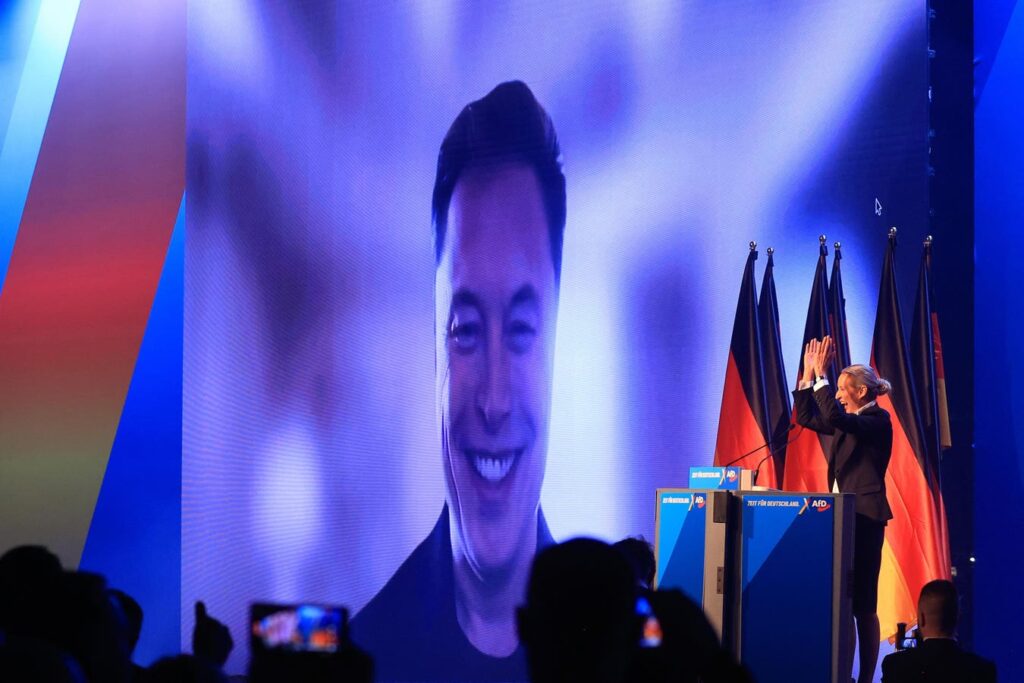Elon Musk, chief executive officer of Tesla Inc., speaks virtually alongside Alice Weidel, co-leader … [+]
A little over two years ago, I argued that Tesla’s market share was poised to decline, citing a range of factors—from intensifying competition and supply chain challenges to a less-discussed (at that time), but equally important, variable: Elon Musk’s controversial acquisition of Twitter. I predicted that his behavior on the platform would alienate the very customer base most likely to purchase an electric vehicle, eventually impacting Tesla sales.
I suggested that it might take a bit of time, because Tesla didn’t have a lot of competition and many Tesla orders were already in the pipeline, but I thought his actions would eventually drive customers away.
Some critics at the time dismissed this view as overly sensational. One commenter called it a “stupid and one-sided analysis”, adding “This article makes it sound like Elon Musk is ruining Tesla with his Twitter-related actions, but revenues are still up every year.”
Data Validates the Warning
Recent data appears to validate my previous analysis.
The latest figures indicate that even though the EV market grew last year, Tesla’s 2024 deliveries dropped double digits from 2023, confirming that the company has indeed lost momentum. It isn’t just the inevitable result of a rapidly expanding EV market where more models are emerging; there’s growing evidence that Musk’s actions have actively deterred potential buyers.
Now, as Tesla’s latest quarterly numbers reveal a marked decline in deliveries, it’s becoming increasingly hard to ignore the impact of Musk’s public persona on the brand. While Tesla continues to maintain a robust revenue stream, the dilution of brand loyalty is evident.
The California New Car Dealers Association (CNCDA) noted, “Things aren’t looking so golden for EV automaker Tesla in the Golden State. Tesla’s dominance in the electric vehicle market continues to falter as the brand reported its fifth consecutive quarterly registration decline. Tesla’s registrations fell 7.8 percent in Q4 2024, contributing to an overall 11.6 percent decline in 2024.”
Impact of Musk’s Public Persona
When the company once enjoyed a near-mythical status as the undisputed leader of the EV revolution, its products were not only about performance and innovation but also about aspirational branding. Today, however, that narrative appears fractured by the growing politicization of Musk.
Critics have argued that Tesla’s market share decline is the inevitable result of an expanding overall EV market, with traditional automakers and startups alike launching competitive models. Indeed, the numbers reflect that the overall market is growing, which in itself presents a challenge for any single company.
Yet, there is more to the story. The loss in market share isn’t solely a byproduct of fierce competition or production constraints—it’s also a signal that consumers are reacting to leadership decisions that seem increasingly disconnected from core customer expectations.
In retrospect, my previous analysis wasn’t just a contrarian take on market dynamics—it was a warning that corporate governance and brand stewardship matter immensely. Musk’s high-profile moves have shifted public discourse in ways that extend far beyond social media. The resulting erosion of trust among a segment of Tesla’s traditional customer base is now reflected in the declining delivery numbers despite an EV market that is still growing.
Looking Ahead: Rebuilding the Connection
As the data unfolds, it’s clear that while Tesla still delivers impressive technological advancements, the company now faces a critical juncture. The challenge is not only to sustain innovation but to rebuild the connection with consumers that once fueled its meteoric rise.
In the end, the evolving narrative around Tesla serves as a reminder: even the most dominant market players must heed the multifaceted demands of modern business—where product excellence, public perception, and leadership behavior all play crucial roles. Musk’s Twitter escapade was seen as peripheral by some, but as Tesla’s latest figures suggest, they’re proving to be a factor in the company’s current market performance.
While Tesla’s share price remains robust, the decline in deliveries signals that its brand is under strain. This divergence underscores a critical reality: technological prowess alone no longer guarantees market dominance. Tesla now faces the formidable challenge of re-establishing a connection with its customers while maintaining its relentless pace of innovation. As investor sentiment begins to factor in the broader implications of leadership decisions and public perception, the coming quarters will be pivotal in determining whether Tesla can reverse the trend.
Read the full article here
